Compost is Black Gold
Most gardeners will be familiar with compost. It is sometimes referred to as black gold, and this name is understandable: it is black, and it is worth so much. If you are planting new plants, or if you are feeding the topsoil, or if you are making cuttings, compost is one of the most valuable things a gardener can have. But not everyone makes their own compost. And with so much information on the internet, some people can be scared to start with their compost journey. We as modern humans are so afraid to begin, and we read so much on the internet about what other people did that we postpone beginning. Composting can be approached with two sides of a spectrum: very clinical and calculated, or very loosely and haphazardly. In this post, I will give you my approach to composting, why you should not be afraid of making your own (if you have the space and means), and why I think making compost will be one of the more important things you do in terms of health (mental health, soil health, and physical health).

Don't Be Afraid of Composting
There are various ways in which you can approach making your own compost. You can get real technical and scientific about it. You can measure your ratio between browns and greens, and there are reasons why you should worry about this. But life is too short and my own approach to making compost is not rule-bound. There are reasons why you would care about the ratio, if you are planting specialized plants, for example. But for the majority of people, I would reckon that composting will not be for this specialized application.

What is compost? If you are a gardener you will already know. But briefly, composting is the breaking down of kitchen scraps, garden waste, and other "natural things". The result is compost, or black gold, or a host of other scientific names. There are three main stages in composting. If we want to be fancy, we can call them what Wikipedia calls them: (i) the Mesophilic phase, (ii) the Thermophilic phase, and (iii) the Maturation phase. In simple terms, the first phase is the starting of the breakdown process in moderate temperature, the second happens at really high temperatures (60C), and the third phase is back to normal temperatures. It is said that when your composting is done right, you can cook an egg in it and also that all the seeds of plants will die. I know a lot of people make black garlic in their compost heaps. It really gets hot! Here are some images of the "stages" of "phases". Or they are more simply put photographs of the start, middle, and end of two of my compost cycles, one I did in 2020, and one I did last week.
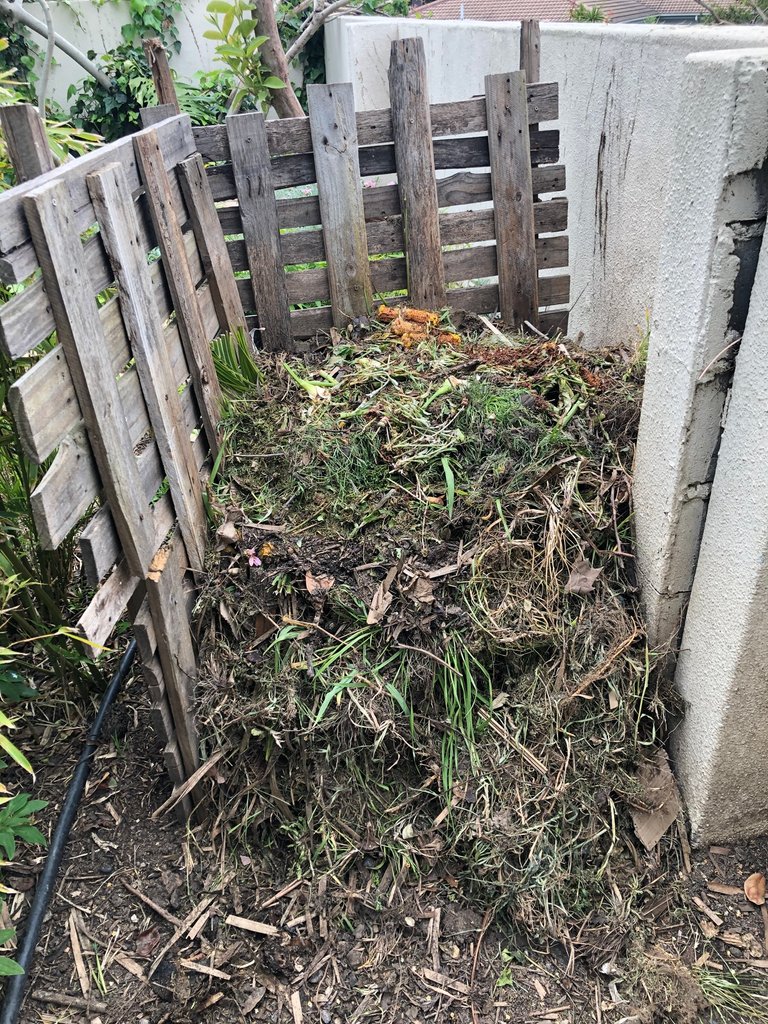
This is a compost batch I did in 2020. Here you can see all the new material that still needs to be broken down.
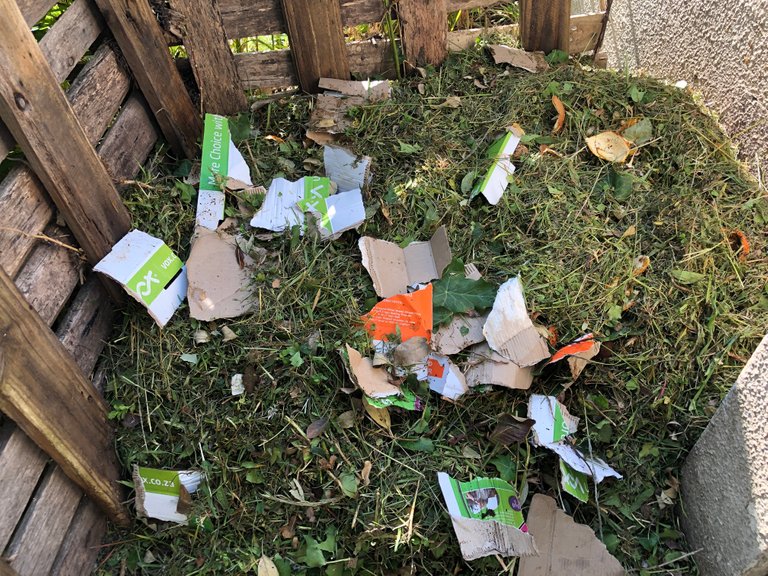
Here you can see my new batch I started last week or so. Nothing is broken down yet.
The next stage is when things heat up and all the color starts to fade to the black we know compost to be. Or it turns white with bacterial and fungal growth (I also think Mycelium growth).

The contrast in color is evedent. This is the 2020 batch. I tried composting palm tree leaves, but it did not really work!
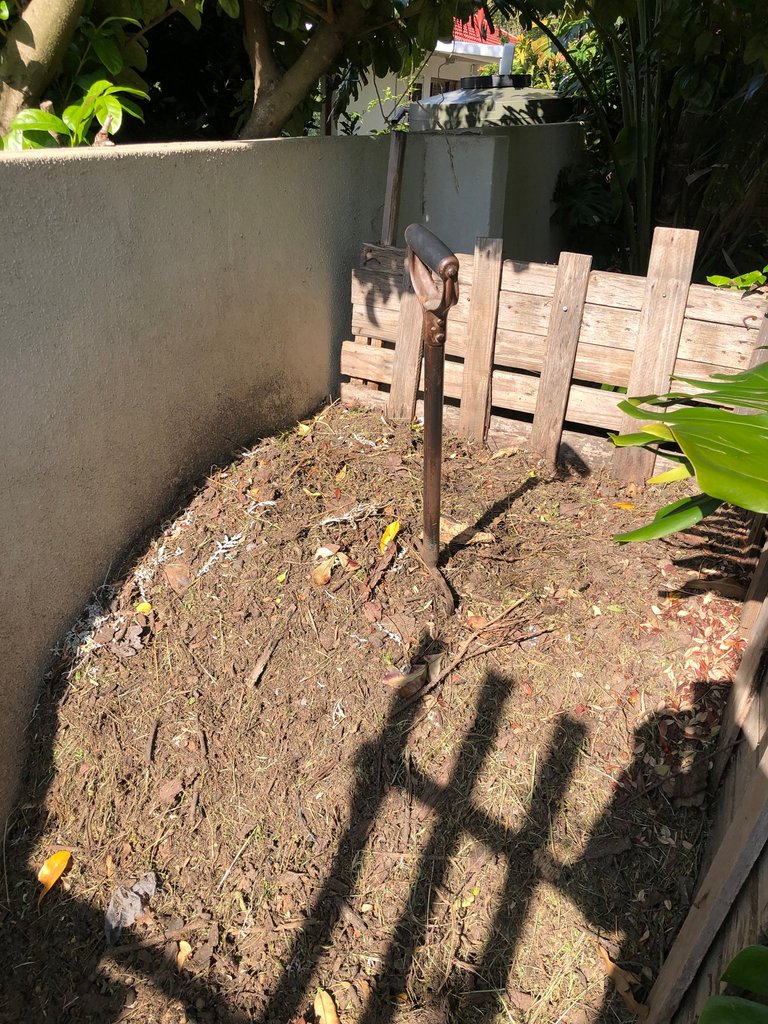
The sun shines on the heap in the early morning, but it is the familiar dark color. This batch got sifted out later and the product was quite nice:


Various bugs live in the compost. I particularly love the Pill bugs. They are so cute to me. They help with breaking down especially woody elements.

A last technical term: your compost can be aerobic or anaerobic. This simply means with air (aerobic) or without air (anaerobic). I generally "turn" my compost every three days or so. I work new material in until I get to roughly a cube (1m x 1m x 1m) of material. The benefit of aerobic composting is that it turns into compost in a fraction of the time, and to me, the most important element is physical and mental health. I discuss this below. But before that, a quick manifesto for haphazard composting.

A Quick Manifesto for Haphazard Composting
There are general rules for beginners to follow to add the appropriate amount of green and brown elements into your compost. I say, do away with all this! My reason is simple: I am making compost to feed the soil, to help with my reduction of waste that gets driven away to landfills, and I am trying to mimic nature. I know I am contradicting myself in some of the things I am saying here, but I feel we do not need to overcomplicate things. I follow the following method of composting: Add everything you can compost into a pile and turn it every three days, work material in as you see fit, and stop when you reach enough material.

Take a lawnmower, if you have one, and chop the leaves and other garden waste into smaller pieces.

If you had some pizza (not very healthy) tear the boxes into smaller pieces. Are you a baker? Tear the paper packaging into smaller pieces. Collect all your kitchens scraps, coffee grounds and tea leaves.




The six phases approach to my composting:
The first phase: You will see the things starting to break down.
The second phase: Things will heat up considerably.
The third phase: There will be no new material to decompose and break down.
The fourth phase: Sift out larger pieces that did not break down, add this to the new compost heap.
The fifth phase: Mature the sifted compost for a couple of days/weeks, make sure it stays at a constant cool temperature.
The sixth phase: Use your compost as you see fit.
Composting for Mental Health, Soil Health, and Physical Health
Composting to me is not really about having compost, yes it is important and valuable, but for me the true value in composting lies in mental health, soil health, and physical health. Let me explain.
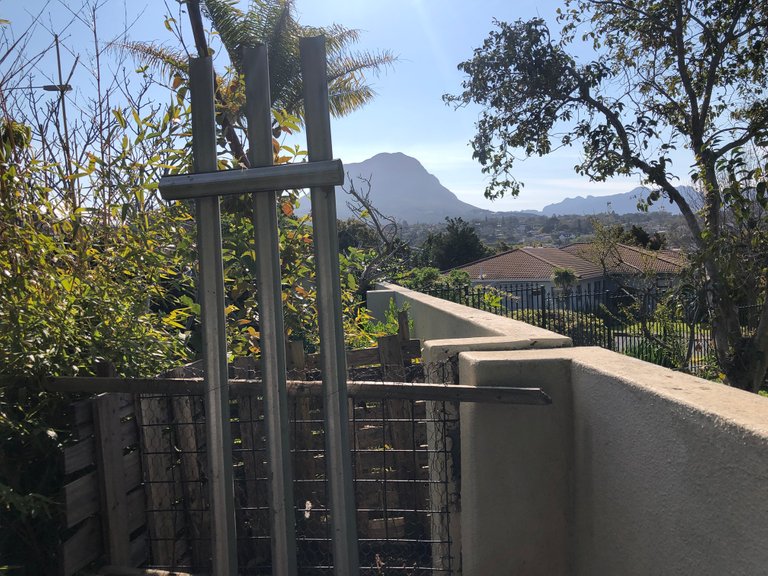
(This is my view whilst I work in the compost. Good for the soul.)
Soil health is an obvious reason why most gardeners compost. It is good for the existing soil, or it can heal "dead" soil. Compost is full of micro-organisms, bugs, worms, and it is generally just "alive". This will help plants, and there are various scientific reasons for this. This is important as modern agriculture takes a different approach to soil health, that is they in some sense disregard it. But I am not going down that path now, instead, I want to make the claim that composting is good for your mental and physical health.
I canceled my gym membership in 2019. It got expensive, and I started to work in the compost heap almost every day. The physical exercise of turning the compost was really good. I regularly clock a 45-minute workout, I sweat like I ran for 45 minutes, and the heavy lifting is good for some muscle stimulation. I know this is not targeting every muscle, and you need a full workout plan that might require a gym, but I get free exercise in the compost and it adds value. I feel so much better lifting a shovel of decomposing matter than standing in front of a mirror lifting weights.
And this is where mental health comes in as well. For me personally, it is better to work in the garden than going to the gym or to go to the beach or malls. I feel the spiritual and soul growth that gardening gives me. And composting is one element of it. Seeing flowers and plants grow because of the compost you made, makes me feel connected to nature; I think most people suffer from a disconnection from nature. This is all oversimplified, but I think we need to get the connection back again.
And one way I feel I can make a better impact regarding the connection to nature is to grow my own food. This is compost I made in 2020:

This is spinach I have grown in that batch of compost for over a year now.
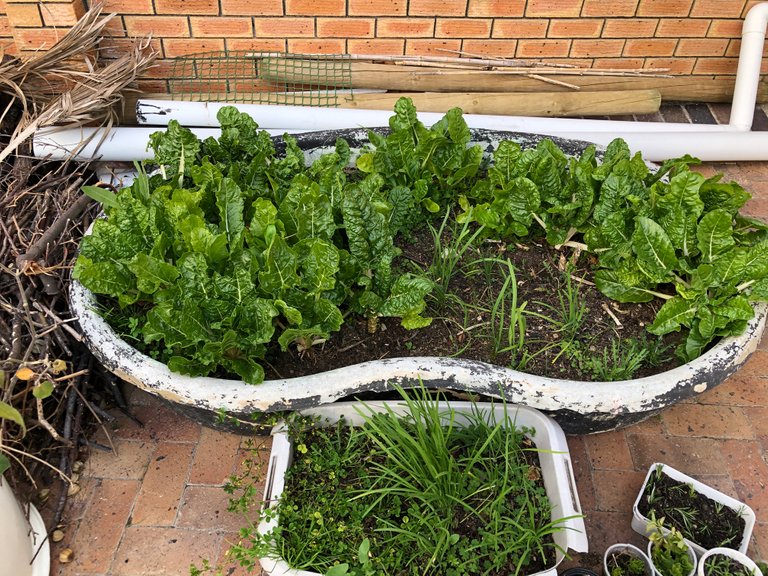
It heals me to eat things I have grown in a medium that I made. There is something primal in that it connects you to nature. I hope that you found this informative. All the images are taken by me on an iPhone. If you read this far, thank you! Please let me know in the comments if you make your own compost, and if you do, what lessons you have learned. Stay safe.
I'm definitely a haphazard composter myself, so it comes out as it comes out. Generally not as nice looking as yours. Usually a bit on the soggy side as most stuff goes in the chicken runs for them to compost, so only things that might make them sick go in the compost bins along with chicken poop and newspaper.
I am mostly lucky that mine turns out okay! With the haphazard style, anything can and will happen. I need the chicken system as well, but I live in a residential area so no chickens really allowed I think. I have thought of getting some quails as they are small and quiet. They would love all the bugs in the compost! Maybe adding some extra grass clippings to compensate for the sogginess?
My chickens and rabbits hare all the grass clippings. I'm not too worried about the sogginess in all honesty. I dig it into the soil a bit before planting, to give it chance to settle in. I wouldn't plant directly in it, though, like you have with your bath (which looks amazing, by the way 😊).
Thank you so much! I play it on the safe side and use my compost mostly as top dressing or mulch style. I try and make quick compost (lots of grass clippings) so planting directly in it can be bad as it still need to break down etc. But I grow hardy so-called weeds in it (like rocket, dandelions, mustard greens) as they are cheap and also I think good for the compost. After I grow these so-called weeds in the compost, I use it as normal compost. I have a whole setup going haha.
But I could reckon that the chicken manure makes for the best compost or addition to soil for veggies?
Whatever I grow in the areas I've had the chickens running in always does well, so I'd hazard a guess that it's good stuff! I was given some bags of sheep manure one year and did better with broccoli that year than the horse manure we can usually get hold of for free.
Free stuff like that is always awesome! I know a lot of regenerative farming (or I know of one) here uses sheep to fertilize the fields, and a winery uses special "face masks" for the sheep so that they can eat the weeds but not the grapes, in so doing fertilizing the soil.
Great post.
Thank you so much I really appreciate it.
Healthy soil is so important, without it, we can not be healthy. Loved this tutorial and how you explained the many benefits of composting xxx
You've been curated by @theherbalhive on behalf of The Herbal Hive.We support any content related to herbalism, from stories about your relationship with medicinal plants, to wildcrafting, foraging, ethnobotany, plant spirituality & herbs as nourishment, as well as the use of natural products to create medicines such as salves and tinctures. Use the tag #theherbalhive or post from our community!
Community II Delegate II Curation TrailII Discord
Thank you so much @theherbalhive for all the support in the last couple of weeks! I really appreciate it. And, again, so glad it resonates with everyone!
Nice job, composting is quite useful in cutting down waste. I have worm bins inside for my cannabis but outdoors we compost.
I wish I had a spot like your thought looks much easier that these black bins
I am very lucky with my setup and the surrounding area.
I still need to get into the worm composting.
And yes, every bit helps right! One less paper bag or food parcel in the landfill is a win. Keep up the good work!
Enjoyed it, thanks. :) Especially the connection to physical and mental health.
I am so glad you enjoyed it! All the best. Thank you for reading 😀
Thanks so much for sharing your knowledge with us. You make it look so easy.
With lots of practice and patience, things become easy. But it takes time. Thank you for reading!
Congratulations @fermentedphil! Your post has been a top performer on the Hive blockchain and you have been rewarded with the following badge:
You can view your badges on your board and compare yourself to others in the Ranking
If you no longer want to receive notifications, reply to this comment with the word
STOPCheck out the last post from @hivebuzz:
HIVE GARDEN COMMUNITYhere!You've been curated by @gardenhive on behalf of the ! We support gardening, homesteading, cannabis growers, permaculture and other garden related content. Delegations to the curation account, @gardenhive, are welcome! Find our community
very nice :)!
Ok, you killed it, it's one of these rare cases when your handle @fermentedphil just fits perfectly, a dash of fermentation, a splash of life philosophy 😄. I've learnt some new stuffs about cardboard, no idea I could add it to the compost!
I compost loads of wine card boxes haha. Thanks! I am meaning to do a series of posts that acts as updates on my "fermentation and philosophy" series. I did them way back in 2017/2018 on steemit. Glad that it resonates!